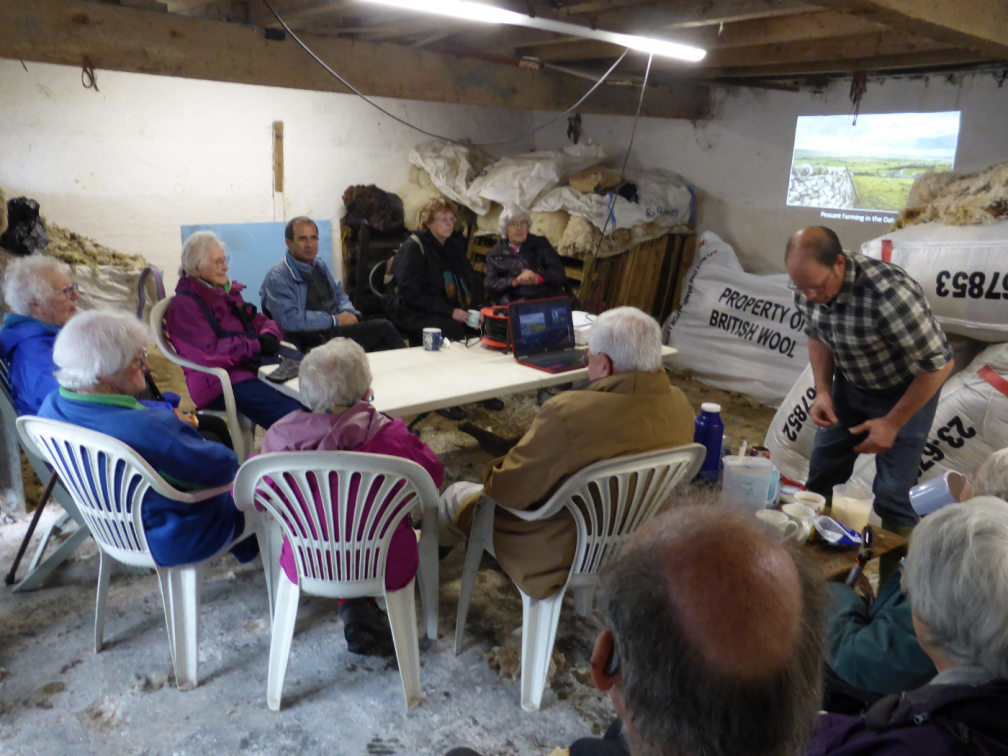Columbans support summer school: ‘Making Space for Nature’
Ellen Teague, a Columban JPE worker and a keynote speaker at the Christian Aware Summer School writes about the importance of biodiversity and the school’s commitment towards it …
A commitment to protect Earth’s biodiversity was made after a recent Christian Aware summer school in the Yorkshire Dales. Around 25 participants promised to be particularly active during the Season of Creation, which starts on 1 September. A keynote speaker was Ellen Teague of the Columban Justice, Peace and Ecology Team.
The event was held 23-28 July, on the theme of ‘Building Biodiversity,’ at Parcevall Hall, an Anglican Retreat Centre with beautiful gardens. It was a week when environmental catastrophes were hitting the news headlines, particularly heatwaves and fires in the Mediterranean countries and exceptional flooding in parts of Asia.
My own Columban inputs focused on the international level, particularly initiatives of Columban missionaries’ Justice, Peace and Ecology Teams globally to save habitats. This includes raising awareness of the importance of oceans in Fiji and tree planting in Pakistan. A Columban delegation attended the UN’s Biodiversity COP15 in Montreal last December as part of an interfaith advocacy presence and saw the Global Biodiversity Framework set up. It was signed by 196 nations on 19 December to “take urgent action to halt and reverse biodiversity loss” by 2030 and to protect 30 per cent of land and sea area by 2030.
To deepen appreciation of the diversity of nature, Dr Judith Allinson of Green Christian ran two botany sessions. The first on Lichens, which are made out of fungi and algae, had the group use hand lenses to study the patterns on the Lichens on the wall outside the conference centre. There are around 1000 lichens in Yorkshire and she explained that lichenologists looking at lichens growing on trees and rocks can see how much Nitrogen-oxide air pollution there is in Yorkshire. Nitrogen is the third most serious planetary boundary being broken after Biodiversity and Climate Change. It comes from fertilizers on fields, from slurry, from chickens and pig farms and traffic pollution.
The second session was at the internationally important Malham Tarn Bog, owned by the National Trust. Judith told us that bogs are a store of peat – a store of carbon, but 80% of bogs are losing their carbon because of government-funded drainage in the past and to the after-effects of pollution. Bogs are also a water store – holding water and releasing it slowly, reducing flooding in the lowlands. They are home to unique plants – in Malham Tarn’s case species of Blue Moor Grass, Ragged Robin and many more.
The summer school – an annual event of the ecumenical charity – explored some examples of what is being done to build biodiversity in the Yorkshire Dales, with talks, slide shows, discussions and visits.
This included learning about ‘the ‘Wild Ingleborough’ project which works with the local community to protect nature. The focus is on protecting whole ecosystems rather than the preservation of specific species and the underlying principle is ‘Making space for nature.’ Jane Skinner, an Anglican priest, presented a fascinating case study of Lundy Island, off the UK coast and where she ministers. Participants marvelled at the bird life on the island.
We heard about sustainable farming from several farmers. We visited John Dawson’s Bleak Bank Farm, a Dales farm with the most beautiful scenery. He’s the fifth generation of his family to run the farm since the 1920s and his son is fully involved. We heard about lambing, sheep shearing, dairy farming, maintaining 10 miles of dry-stone wall and the huge amount of administration involved in farming these days. Running small farms is stressful and he told us that 88% of farmers under the age of 40 rank poor mental health as the biggest problem facing farmers today.
He was one of several of the speakers we met who knew the work of Catholic Mary Colwell to protect the Curlew and he had delayed cutting silage in a field where chicks were hatching. “We waited until they flew away,” he told us. And he was firm that, “we won’t use GM (genetic modification).”
Participants in the summer school studied as a community during the week – sharing ecumenical worship, bible study and discussion and weaving faith insights into the issues highlighted. We left motivated and hopeful that Christians have a role to play in helping build a more sustainable world, both through advocacy at national and international levels and through cherishing the natural world, which is the context of all our lives.
__________________________


